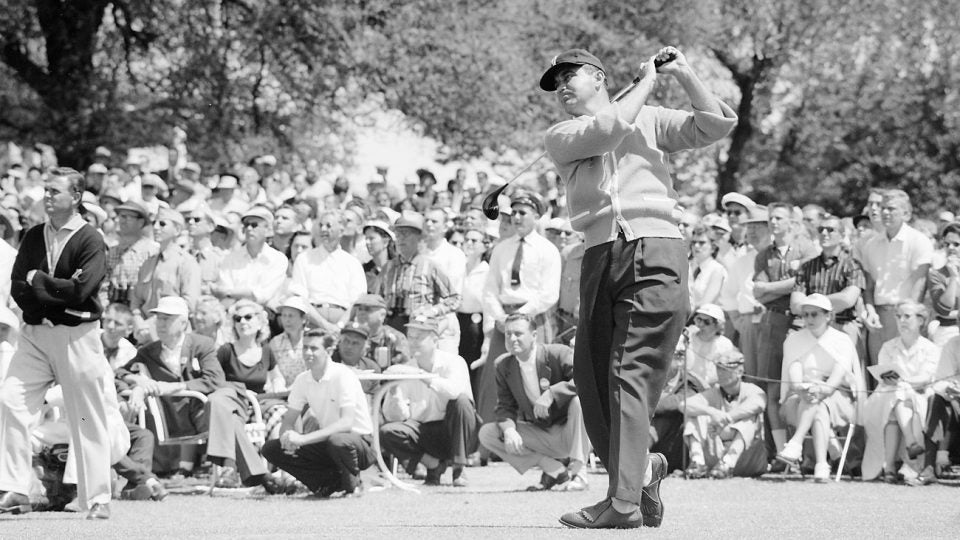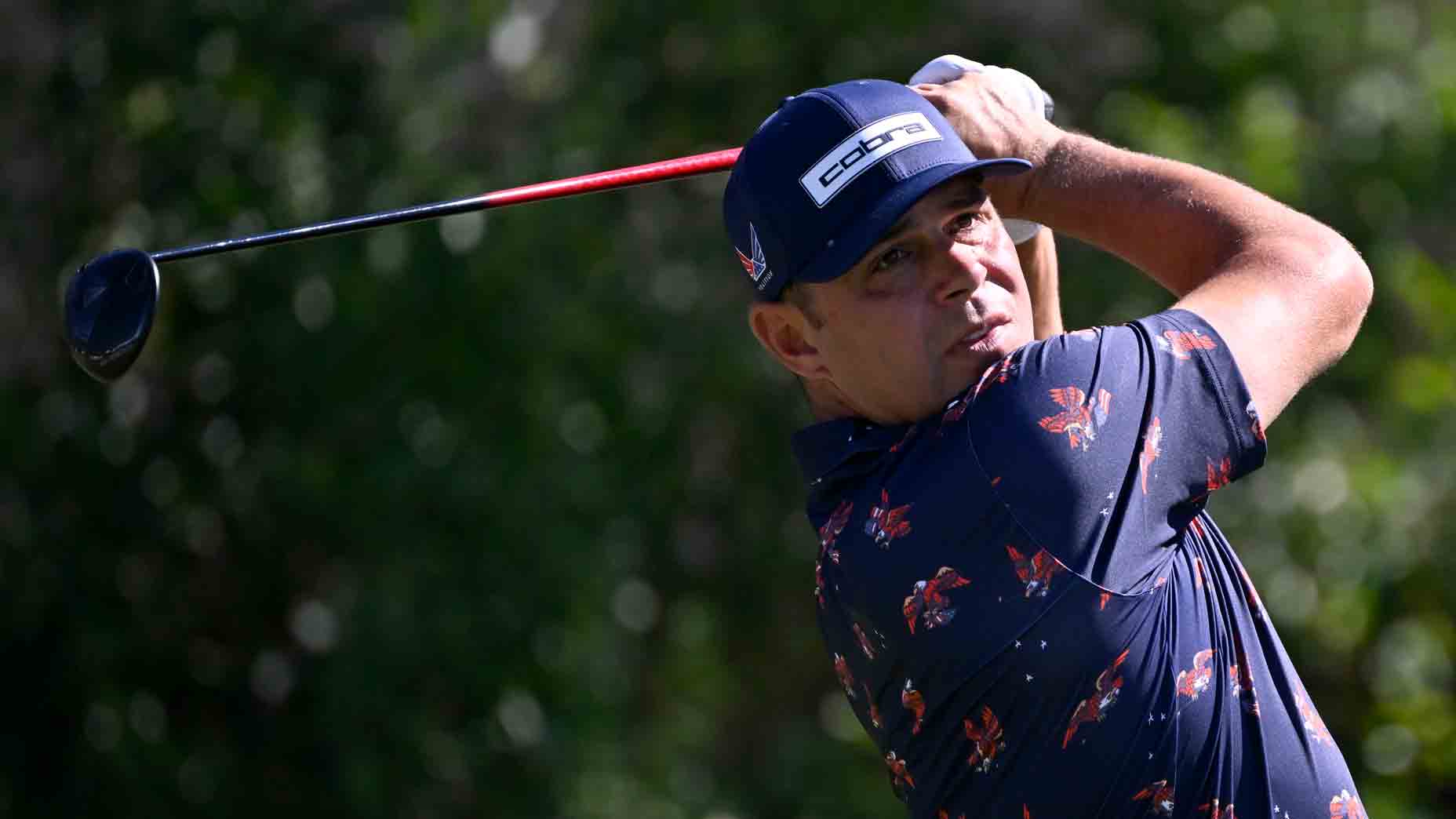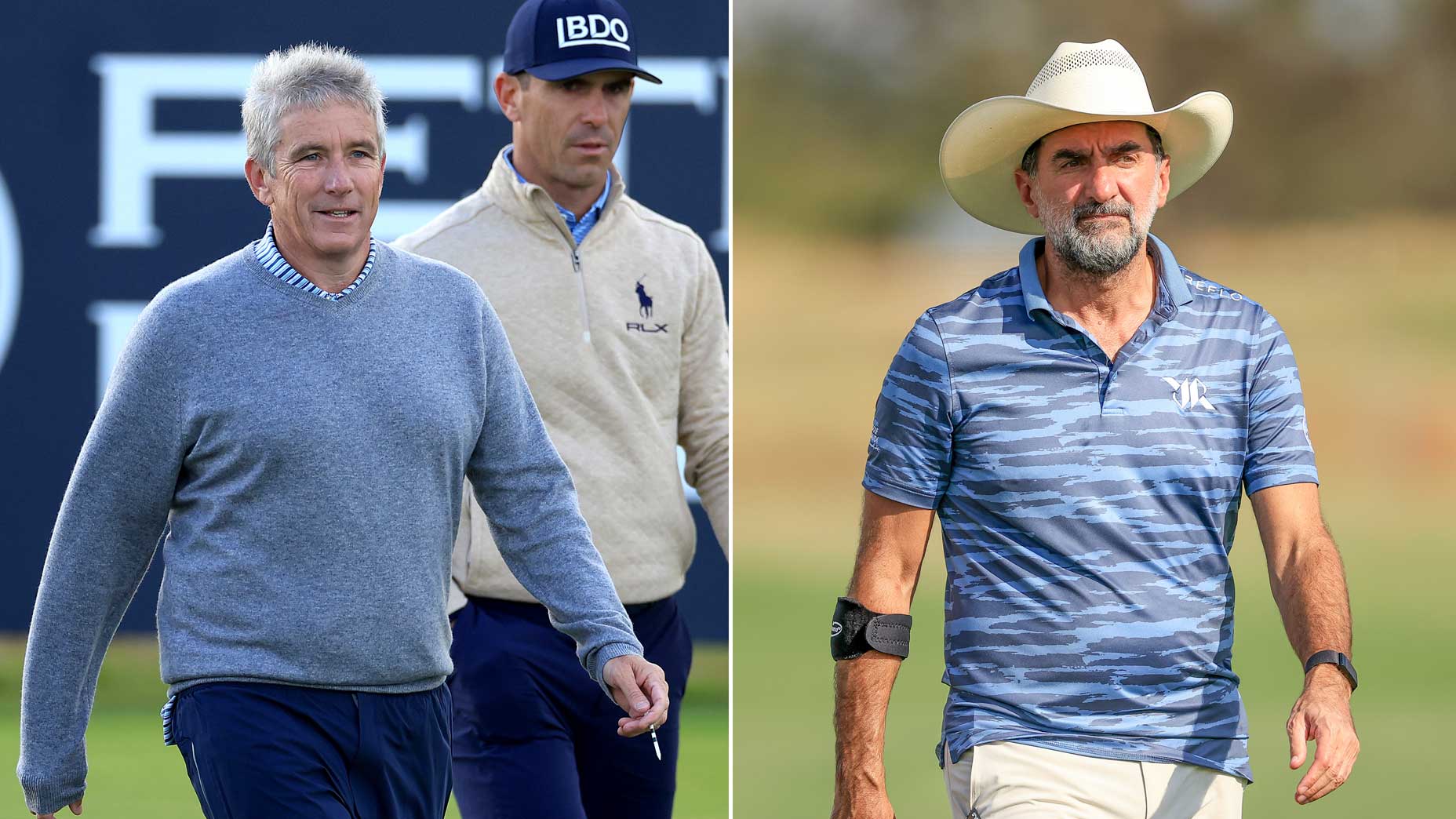One of the things professional golf does best is hand down the game from one generation to the next. This hasn’t happened by accident. Part of that tradition is the nature of the game — you can get on Tour at age 22 and routinely find yourself paired with players twice your age. The handing-down thing also happens because every April two pro golfers and close friends, Bob Goalby and Doug Ford, would get in a shiny Cadillac and drive from South Florida to Augusta, Ga., to attend the Masters dinner for former champions and hang with the kids.
Goalby won his coat in 1968 and Ford in 1957, so over the years they had a seat at the Tuesday night table with Jones and Sarazen, with Snead and Hogan, with Nicklaus and Watson, with Woods and Spieth. Doug Ford, for a long time, had been the oldest living member of the club within the club, until he died on Monday at 95. He is succeeded by Jackie Burke as the oldest living Masters champion and by Bob Goalby as the old living Masters champion who comes to the tournament every year.
Patrick Reed might want to sit next to Goalby at next year’s dinner and ask him about Ford and the New York mobsters Ford played with as a New York kid and about the weeks he made more money by missing a cut than making it, because of all the local Saturday-Sunday action a guy with a wallet and some nerve could find.
Golf was ethnic in Ford’s era and general neighborhood — New York City, Westchester County, southern Connecticut. The guys who taught and worked in the pro shops then and there had Irish, English and Scottish surnames. The Italians were greenkeepers and caddie masters and cooks. Ford’s father, also a golf pro, changed the family name from Fortunato to Ford only to help him find some indoor golf work. As it happens, Mike Ford owned an indoor driving range in Manhattan for a while. (Talk about being ahead of your time.) For a half-decade or so in the 1990s, there were three men at the champions dinner at Augusta with shortened surnames from their old-country originals. Gene Sarazen was born Eugenio Saraceni. Somewhere in Fred’s family history (his paternal grandparents) Coppola got changed to Couples. Plus, Doug Ford.
Ford was born in the summer of ’22, meaning he turned 18 in the summer of ’40. He enlisted in the Coast Guard Air Division and didn’t turn pro until 1949, the year he turned 27. (How many Greatest Generation golfers are left?) In addition to the ’57 Masters, he won the 1955 PGA Championship and 17 other Tour events, including some of the most important events on the schedule. He won the Western Open, the Canadian Open twice and the Pebble Beach Pro-Am. He also won repeatedly in New York’s Met Section PGA when the golf level there was half of notch below Tour standards, if that. Also, as Curtis Strange noted via Twitter on Tuesday, Ford was a “huge part of the creation of the tour as we know it today.” Strange meant that culturally and politically — Ford was part of the group that, in 1968, moved to separate the touring pros from their pro-shop/lesson tee PGA of America brothers (and sisters).
When Ford was told he was being inducted into the World Golf Hall of Fame, he said, “It took a little while, but I think it’s great they’re doing this while I’m still alive.” He didn’t need the stamp — Ford had other ways of measuring himself — but it’s always nice to be recognized. Noting Ford’s death, Jack Nicklaus said, “You don’t win a PGA Championship and the Masters and not be one of golf’s great competitors.”
In 1955, the PGA Championship had a totally different format than it does now, but that format — its legacy and the people who won it when it was grueling — has a lot to do with why it is still considered a major championship today. The PGA Championship was, among other things, an endurance test. It started with a Wednesday-Thursday 36-hole qualifier, which Ford won that year, at the Meadowbrook Country Club, one of Detroit’s prominent “Jewish” golf clubs, in an era when a lot of attention was paid to that sort of thing. That was a good start for Ford — it got him in the 64-man match-play field — and it earned him $250.
He then won two 18-hole matches on Friday, one 36-hole match on Saturday, another one Sunday, a third one on Monday and played Cary Middlecoff in the 36-hole Tuesday final, which he won in 33 holes, four holes up with three to play. (That is, 4&3.) Herbert Warren Wind’s write-up on the week for Sports Illustrated is a time-capsule pleasure. Describing the finalists and their pace of play, Wind put Ford in the hare category and the good doctor (Middlecoff was a dentist) in the tortoise.
The two men played in oppressive July heat and Ford’s 10-year-old namesake son, on summer vacation and in the gallery, carried a folding chair for his father to sit in between shots. “That chair saved my legs,” Ford told Jim McCabe of the PGA Tour many years later. “You couldn’t rush Doc. But I didn’t care. I just sat in that chair.”
The victory earned Ford another $5,000. His haul for the week — $5,250 — is the equivalent of about $50,000 today. Justin Thomas, like Ford the son of a golf pro, earned $1.9 million when he won the PGA Championship last year. Later in the year Thomas said, “Never in my mind have I been like, ‘OK, I’m playing golf to win all this money.'” Doug Ford could not possibly relate.
Like all the touring pros of his generation, Ford kept a close eye on his money, coming in and especially going out. A telling thing is how often Ford mentioned the word “money” in his 2011 Golf Hall of Fame induction remarks. It was an incredible evening, in part because Ford was introduced by Goalby, and about every third sentence out of Ford’s mouth had the word “money” in it.
Goalby, introducing Ford, told how Sam Snead used to refer to Ford as Otis.
“What are you calling him Otis for?” Goalby asked Snead, in his telling.
“Because he’s like the Otis elevator,” Snead said. “He’s up and down at every green.”
Ford had a looping swing and he wasn’t long, but he was a magician with a wedge and a putter. Through three rounds in the ’57 Masters, Snead was leading at two under, Arnold Palmer was one under and Doug Ford was one over. He shot a final-round 66 that included holing out from a plugged lie in greenside bunker on 18. Describing the shot for the Augusta Chronicle, Johnny Hendrix, its sports editor, wrote, “Ford walked into the sand and with about as much deliberation as a waiter picking up a 10-buck tip, he swung.” Ford won by three.

The next year, Ford finished a shot behind Palmer and draped him in his first greet jacket. Ford’s first-place paycheck at Augusta was $8,750, though over time it was surely worth far more than that. Ken Venturi, Palmer’s fourth-round playing partner, spent the rest of his life questioning, with no merit, a ruling Palmer received on the 12th hole of that round. Ford never did, not in public, not in private. “I only have myself to blame,” Ford said then and many times afterward. “I missed birdie putts on No. 17 and 18 that would have won it. I don’t blame the rules committee.”
In one-on-one conversation, Ford would not be shy about telling you one of the incentives he and the others of his generation had for making it to Augusta each year. Yes, they enjoyed see the guys and telling the stories. Yes, they enjoyed playing in the Par-3 Tournament and eating lunch on the porch. But also there was the club’s “honorarium” for former Masters champions – 5K or 10K, the number changed over the years, but you got something for showing up, and it meant something to those on the receiving end. Ford was an outstanding example of a pro golfer who never forgot the “pro” part of his job title.
Pro meant you carried yourself a certain way, you dressed the part, your language — your public language — was never crude, and for your troubles and your play you expected and received a check that would not bounce at the end of the day.
At his Hall of Fame induction, Ford talked about how a Tour rookie couldn’t take any money for the first six months, how you had to finish in the top 15 to make any money and referred to the 36-hole cut as “the money cut.” But he was also on four Ryder Cup teams (no money for that), various Tour committees (no money for that) and he gave thousands of swing tips to thousands of golfers at a public course he owned in South Florida (no money for that).
In Ford’s death, the PGA of America noted that Ford’s two sons are PGA pros, Doug Jr., in South Florida, and Mike, owner Jack O’Lantern Resort in New Hampshire. His daughter, Pam, is an assistant state attorney in Florida. Ford’s wife, Marilyn, died in 1988. One of their grandchildren, Scott Ford, is a fourth-generation golf professional with the Ford surname.
At his Hall of Fame induction, Ford, then 88, spoke without notes and from the heart. He talked about the look the New York Yankees were giving him as a third baseman. His father asked how long his career in baseball might last. About 10 years, Ford said.
His father said, “Why don’t you stay with the golf? You’ll last forever.”
Michael Bamberger may be reached at mbamberger0224@aol.com.







